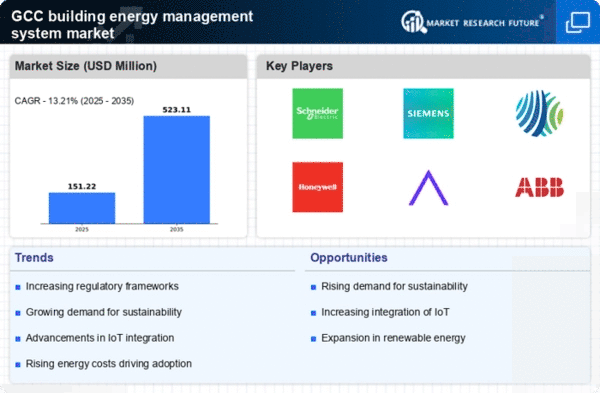Rising Energy Costs
The building energy-management-system market is experiencing a surge in demand due to escalating energy costs across the GCC region. As energy prices continue to rise, businesses and building owners are increasingly seeking solutions to optimize energy consumption and reduce operational expenses. The implementation of energy-management systems can lead to savings of up to 30% in energy costs, making them an attractive investment. This trend is particularly pronounced in commercial buildings, where energy expenditures can account for a significant portion of operating budgets. Consequently, the need for effective energy management solutions is becoming more critical, driving growth in the building energy management system market.
Technological Advancements in IoT
The integration of Internet of Things (IoT) technologies is revolutionizing the building energy management system market. IoT-enabled devices facilitate real-time monitoring and control of energy usage, allowing for more precise management of resources. This technological evolution enables building operators to identify inefficiencies and implement corrective measures swiftly. The GCC region is witnessing a rapid increase in smart building projects, with investments projected to reach $10 billion by 2026. As these technologies become more accessible and affordable, the building energy-management-system market is expected to expand significantly, driven by the demand for smarter, more efficient buildings.
Growing Awareness of Environmental Impact
There is a growing awareness among businesses and consumers in the GCC regarding the environmental impact of energy consumption. This heightened consciousness is prompting organizations to adopt sustainable practices, including the implementation of building energy-management systems. By utilizing these systems, companies can not only reduce their energy consumption but also enhance their corporate social responsibility profiles. the building energy management system market is likely to see increased demand as organizations strive to meet sustainability goals and comply with environmental regulations. This trend reflects a broader shift towards eco-friendly practices in the region.
Increased Focus on Operational Efficiency
The drive for operational efficiency is becoming a key motivator for the adoption of building energy-management systems in the GCC. Organizations are recognizing that optimizing energy use not only reduces costs but also enhances overall operational performance. By implementing energy-management systems, businesses can streamline their energy consumption processes, leading to improved productivity and reduced waste. This focus on efficiency is particularly relevant in sectors such as hospitality and retail, where energy costs can significantly impact profit margins. As a result, the building energy management system market is poised for growth as more companies seek to enhance their operational efficiency through advanced energy management solutions.
Government Initiatives for Energy Efficiency
In the GCC, government initiatives aimed at enhancing energy efficiency are playing a pivotal role in the expansion of the building energy management system market. Various national policies and programs are being introduced to promote energy conservation and reduce carbon footprints. For instance, the Saudi Vision 2030 and UAE Energy Strategy 2050 emphasize the importance of sustainable energy practices. These initiatives often include financial incentives for adopting energy-efficient technologies, which can significantly lower the initial investment barriers for businesses. As a result, the building energy-management-system market is likely to benefit from increased adoption driven by supportive government frameworks.
















